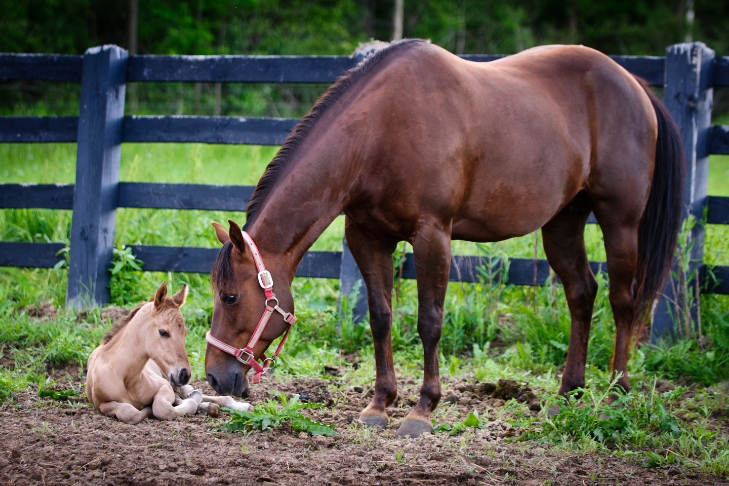
If you’re new to horses or you’re thinking about bringing a horse to your home, you might be wondering how long horses live. It’s important to be aware of the commitment you’ll need to make when it comes to providing for a horse.
There’s not always a simple answer when determining a horse’s lifespan. There are many different variables to consider before providing a single answer. However, we’ll cover information about:
- Average lifespans
- Horse breeds with particularly long lives
- Factors that affect a horse’s life
- How to extend and improve your horse’s lifetime
The Average Horse Lifespan
On average, a horse will live between 25 and 30 years, but there have been domestic horses that reach their 50s or even 60s. There are plenty of factors that impact the length of a horse’s life. There are also many steps a horse owner can take to prolong a horse’s life. We’ll cover those steps later in this article.
For now, let’s take a look at common health conditions in horses that can either shorten or extend the horse’s predicted lifespan.
Common Health Conditions in Horses
There are several conditions that affect how long a horse might live. Some of these conditions can be controlled and monitored by responsible horse owners, but other conditions are biological.
Common health conditions and health features that impact their lifespan include:
- Activity Level: The workload that a horse completes regularly will affect his or her lifespan. Horses that perform dangerous or laborious work tend to have shorter lives than horses with more moderate levels of exercise paired with adequate rest.
- Breed: Some horse breeds have natural longevity traits compared to other breeds. Typically, smaller horse breeds live longer than larger horse breeds. Icelandic horses, Quarter Horses, Arabians, Haflingers, and Appaloosas are among the longest-living horse breeds.
- Diet & Nutrition: Diet and nutrition play a key role in a horse’s quality of life, and horses with optimal diets are likely going to have longer, healthier lives than other horses.
- Level of Care: Domestic horses require substantial care, so having a horse that sees a veterinarian regularly is a good way to keep horses living long lives. A veterinarian should handle your horse’s general care, dental care, and hoof maintenance.
- Diseases & Injuries: A horse that develops a serious injury or illness may deal with long-term health issues that reduce the animal’s lifespan. This is especially true when the injury or illness results in a chronic condition.
Signs of Aging in Horses
All mammals show signs of aging as time passes, and for horses, the most observable of these signs are physical.
Aging horses may develop a dip in their backs, experience reduced strength in their joints and tendons, and lose muscle mass. These changes usually start small and will progress as the horse gets older.
An aging horse may also have drooping lips and eyes that are less clear and reactive than the eyes of a young horse. Further, older horses grow gray hairs around the muzzle and eye area, but the horse’s entire coat may eventually become dull.
Old horses that have not had regular dental care may also have noticeably long teeth. This is where the phrase “long in the tooth” comes from.
Finally, an old horse may develop arthritis, which causes the animal to move slower due to the stiffness that affects their joints.
How to Extend Your Horse’s Life
Though there is no way to account for things that happen out of the blue, there are several steps that horse owners can take to extend their animal’s lifespan. To ensure that your horse lives their longest and best life, take care of the following items.
- Train with Safety in Mind: If you train your horse for events, do so in a way that keeps their safety paramount. Avoid training on unfamiliar terrain, and give your horse time to learn a new routine before asking for perfection. This way, you’ll avoid many of the ways injuries could occur.
- Have a Routine: Give your horse a predictable life, one that lets the animal stick to a routine. For example, allow the horse to eat and exercise around the same time each day to avoid stress.
- Encourage Social Behaviors: Let your horse interact with other horses and people. Horses can be very social creatures and when their interaction needs are met, they tend to feel more secure and satisfied.
- Balance Your Horse’s Lifestyle: If your horse performs work, ensure that the horse’s rest time is adequate. Overworking a horse can lead to health risks, so if you can, let the animal have a calm, relaxing life. Consulting your horse’s veterinarian is essential for the best horse care, but if you’d like to try natural remedies for your horse, ask your veterinarian.
- Monitor Weight: When horses get older, their activity levels may decrease. If they’re eating the same amount of food, the horse may start to gain weight. Owners who notice weight gain in horses should take steps to keep a horse’s weight as healthy as possible.
- Focus on Nutrition: A horse’s diet needs to be a high-quality one to ensure the animal is getting all the nutrients it needs. Providing a horse with a healthy diet is a great way to keep the animal living for as many years as possible.
- Have Regular Veterinary Care: Veterinary care is a must. If you want your horse to live its longest and best life, make sure the animal regularly sees a veterinarian for routine care.
Providing adequate care for a horse is challenging, time-consuming, and expensive. Both horse owners and individuals who hope to one day have horses should consider what they need to do to provide a horse with a long and healthy life.
